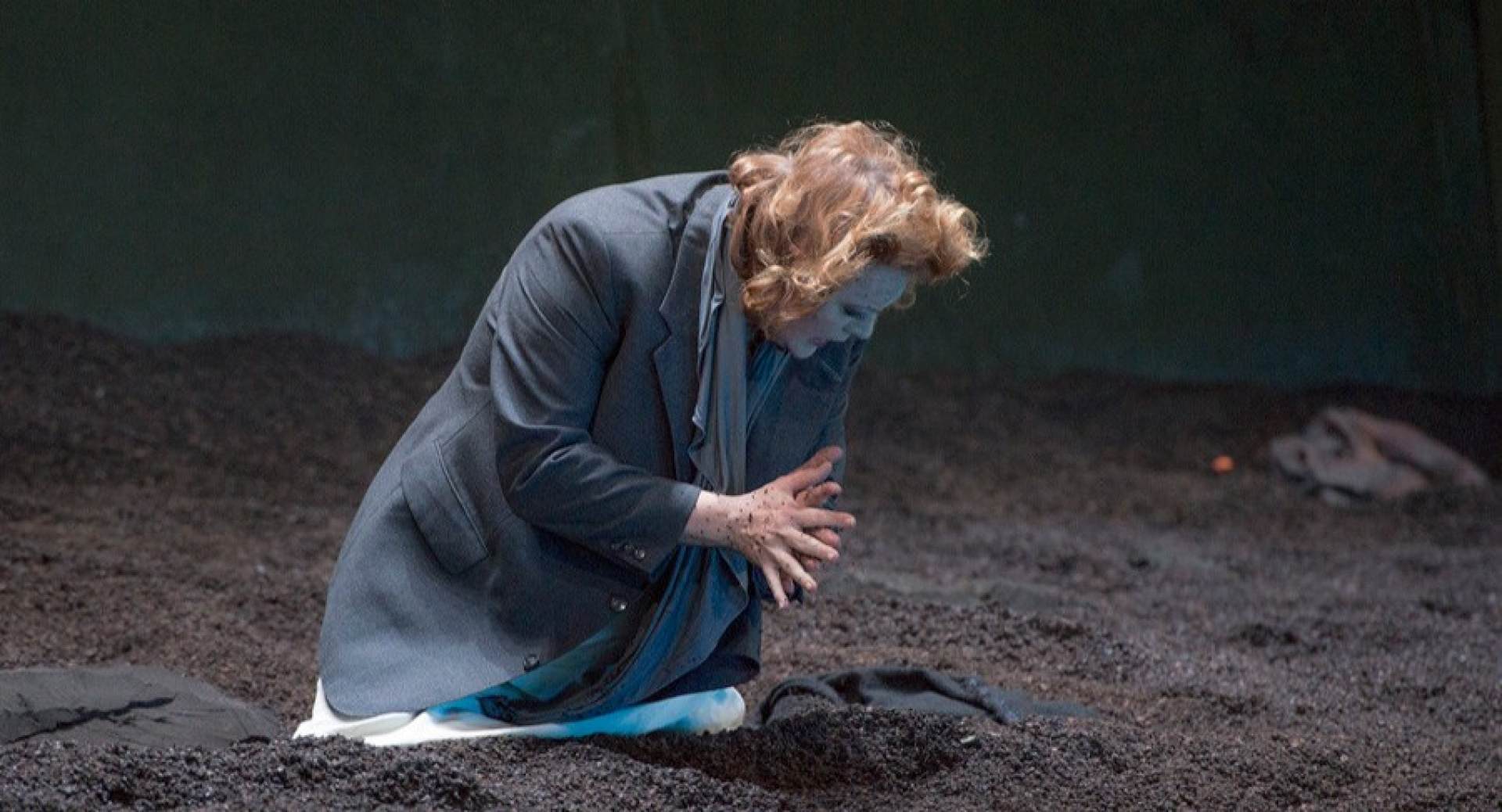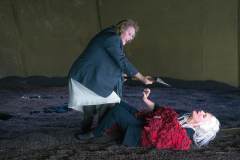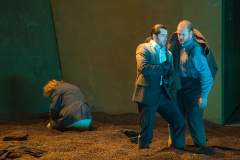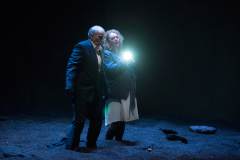Elektra
Mo | Tu | We | Th | Fr | Sa | Su |
Elektra - Richard Strauss (1864 – 1949)
Tragedy in one act
Poem by Hugo von Hofmannsthal
First performance on 25th January, 1909 at Dresden
Premiered at the Deutsche Oper Berlin on 3rd November, 2007
Recommended for ages 16 and up.
Duration: 1 hr 45 mins / no interval
In German with German and English surtitles
Pre-performance lecture (in German): 45 minutes prior to each performance
About the performance
In a courtyard of the Mycenaean palace servant girls speak disparagingly about Elektra. Elektra has not got over the murder of her father, Agamemnon, and the idea of revenge dominates her thoughts. Only one of the maidservants shows sympathy for her and is punished as a result. Elektra is yearning for the moment when vengeance will be hers and fully believes that it will come about by the actions of her brother, Orest, who was brought up in a distant region. Her sister, Chrysothemis, finds Elektra’s existence hard to bear and attempts to protect her from their mother, who has evil intentions. Chrysothemis wants to leave that awful place along with her sister so that they can live in freedom. Their mother Clytemnestra, who has been plagued by nightmares since she killed her husband, asks her daughter Elektra for help and while their conversation lasts it seems as if the two women might be reconciled. But Elektra’s hatred flares up again when Clytemnestra lies to her daughter over the whereabouts of her son, Orest. Elektra replies ambiguously to Clytemnestra’s question about the remedy for her anguish and fear, telling her mother that once the proper animal has been sacrificed under the axe her bad dreams will cease. Two strangers arrive and report the death of Orest. Elektra expresses her desire to ally with Chrysothemis in committing the deed, but her sister cannot contemplate such a thing. Determined to avenge herself, Elektra resolves: “Fine, then, I’ll do it alone!” One of the strangers moves closer to Elektra; shaken at the sight of her physical and emotional state, he allows her to see who he is: Orest. He exits to do the deed and presently Clytemnestra’s screams can be heard as she dies. Whereupon Elektra lures Aegisthus into the palace and he is killed by Orest as well. Agamemnon has been avenged. Nonetheless, Elektra stays in the palace feeling no sense of relief; she dances herself to death.
“Despite the scale of the score, ELEKTRA is very much a chamber drama. Rather than creating a series of gruesome images for the stage, I’m interested in rendering palpable the state of horror vacui in which people exist. The lines separating passion and obsession are dangerously blurred and we see this everyday in the news and in our daily lives. The thing about Elektra that moves me is her inability to grieve. She refuses to grieve and has constructed an existence that rules out the possibility of finding closure after loss. Deep, existential feelings such as anguish require a channel of expression. People who can grieve do not feel compelled to hate. ELEKTRA’s impact lies in its revelation of the sheer scale that behavioural patterns can take on when these patterns cannot be called into question. Chrysothemis can see a way to break the spiral of violence but she’s unable to sway her sister and liberate her from the mental vice grip that she’s in. While Elektra ends up riven emotionally in a reflection of her desolate inner world, with her personality floundering in a pandemonium of escalating emotions, only Chrysothemis is left, unable to escape a palace full of ghosts, the sole surviving member of the clan…” (Kirsten Harms, 2007)
Program and cast
Conductor: David Afkham
Director: Kirsten Harms
Set-design, costume-design: Bernd Damovsky
Chorus Master: Jeremy Bines
Choreographer: Silvana Schröder
Klytämnestra: Karita Mattila
Elektra: Catherine Foster
Chrysothemis: Flurina Stucki
Aegisth: Burkhard Ulrich
Orest: Tobias Kehrer
Der Pfleger des Orest: Jared Werlein
Die Vertraute: Hye-Young Moon
Die Schleppträgerin: Lucy Baker
Ein junger Diener: Thomas Cilluffo
Ein alter Diener: Michael Bachtadze
Aufseherin: Maria Motolygina
1. Magd: Stephanie Wake-Edwards
2. Magd: Martina Baroni
3. Magd: Arianna Manganello
4. Magd: Maria Vasilevskaya
5. Magd: Nina Solodovnikova
Chorus: Chor der Deutschen Oper Berlin
Orchestra: Orchester der Deutschen Oper Berlin
Dancer: Opernballett der Deutschen Oper Berlin
Deutsche Oper Berlin
The Deutsche Oper Berlin is an opera company located in the Charlottenburg district of Berlin, Germany. The resident building is the country's second largest opera house and also home to the Berlin State Ballet.
The company's history goes back to the Deutsches Opernhaus built by the then independent city of Charlottenburg—the "richest town of Prussia"—according to plans designed by Heinrich Seeling from 1911. It opened on November 7, 1912 with a performance of Beethoven's Fidelio, conducted by Ignatz Waghalter. After the incorporation of Charlottenburg by the 1920 Greater Berlin Act, the name of the resident building was changed to Städtische Oper (Municipal Opera) in 1925.
Deutsches Opernhaus, 1912
With the Nazi Machtergreifung in 1933, the opera was under control of the Reich Ministry of Public Enlightenment and Propaganda. Minister Joseph Goebbels had the name changed back to Deutsches Opernhaus, competing with the Berlin State Opera in Mitte controlled by his rival, the Prussian minister-president Hermann Göring. In 1935, the building was remodeled by Paul Baumgarten and the seating reduced from 2300 to 2098. Carl Ebert, the pre-World War II general manager, chose to emigrate from Germany rather than endorse the Nazi view of music, and went on to co-found the Glyndebourne opera festival in England. He was replaced by Max von Schillings, who acceded to enact works of "unalloyed German character". Several artists, like the conductor Fritz Stiedry or the singer Alexander Kipnis followed Ebert into emigration. The opera house was destroyed by a RAF air raid on 23 November 1943. Performances continued at the Admiralspalast in Mitte until 1945. Ebert returned as general manager after the war.
After the war, the company in what was now West Berlin used the nearby building of the Theater des Westens until the opera house was rebuilt. The sober design by Fritz Bornemann was completed on 24 September 1961. The opening production was Mozart's Don Giovanni. The new building opened with the current name.

 EN
EN DE
DE IT
IT FR
FR ES
ES RU
RU JP
JP RO
RO
 Seating plan
Seating plan 



